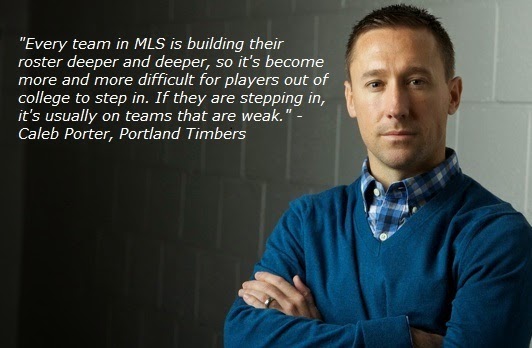Winning the NCAA Tournament takes much more than being the
best on the field. The lives of college athletes become consumed with their sport
come tournament time; having to worry about exams and assignments while on the
road doesn’t make life any easier. The Virginia Cavaliers Men’s Soccer program
managed to find the balance as they claimed their seventh national championship
in 2014.
 After an early exit in the Atlantic Coast Conference
Tournament at the hands of defending national champions, Notre Dame 3-0, the
Cavaliers went on a run for the ages. UVA would walk by UNC Wilmington in the
first round only to be followed by a meeting with the Fighting Irish once
again. UVA traveled to Indiana and came out victorious thanks to an 82nd minute winner from central midfielder, Nicko Corriveau, ending any hopes of a
repeat for Notre Dame.
After an early exit in the Atlantic Coast Conference
Tournament at the hands of defending national champions, Notre Dame 3-0, the
Cavaliers went on a run for the ages. UVA would walk by UNC Wilmington in the
first round only to be followed by a meeting with the Fighting Irish once
again. UVA traveled to Indiana and came out victorious thanks to an 82nd minute winner from central midfielder, Nicko Corriveau, ending any hopes of a
repeat for Notre Dame.
The Cavaliers would move on to Washington, D.C. to take on Georgetown. The Hoyas would break the deadlock in the 59th minute
and held their lead until the final minute when UVA found the equalizer pushing
the game to extra time. The match would go to penalty kicks and UVA came out on top, advancing to the College Cup.
A convincing performance against underdogs, UMBC, in the
semi-finals set the stage for a match-up of college soccer heavy weights in the
final, UVA and UCLA. 90 minutes of scoreless action was followed by two similar
overtime periods. Penalty kicks would decide the winner, and UVA silenced their
critics over taking UCLA 4-2 from the spot.
“The most rewarding thing about winning the championship was
that most "analysts" predicted us to lose pretty much every game we
played,” said Corriveau. “We knew how
hard we worked and it’s very rewarding to see your hard work pay off.”
But that hard work doesn’t end when training is over or when
the weight room closes for college athletes, the work never ends. Keeping up
with the academic side for athletes during the NCAA Tournament becomes a much
more daunting task. Without attending classes due to traveling during the
College Cup, Corriveau and the UVA Men’s Soccer program would have to do their
work on the road.
The Virginia Cavaliers played five games in three weeks
traveling from Virginia to Indiana, from Indiana to Washington D.C. and from
D.C. to North Carolina.
“The most difficult part has to be the expectation of
college professors that we have the same ability to perform in school as
regular students when our free time isn't nearly the same with all the
obligations we have,” said Corriveau.
Corriveau has a different type of pressure than most other
men’s soccer players at UVA for the mere fact that he wears the no.10, as a
sophomore none the less. UVA has seen some of the best midfielders the United
States has to offer come through the program, most notably, Claudio Reyna,
formerly of Manchester City, as well as American legend, John Harkes.
“When you look at all the great players that have gone
through here and worn the no. 10 it makes you really think that you have to
perform at their level and constantly push yourself,” said Corriveau. “People
expect the no. 10 to be the best player on the field so it is a challenge, but
a good one.”
The Cavaliers followed up their historic fall campaign with
a trip to England which they've just completed. UVA dismantled the Crystal Palace U21s 4-0 and earned two draws against the Blackburn and Burnley U21s.
Keep it here for weekly installments, as we expose some of
the greatest and poorest aspects of college soccer as told by the players.
#CollegeSoccerExposed




